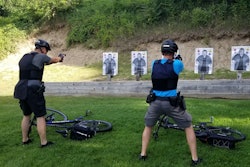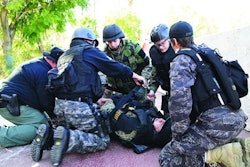Late last month, one of the officers with the University of Colorado Boulder Police Department became the latest in a growing number of police professionals to have undergone "train-the-trainer" training in skills employed in de-escalation of and intervention with peers during situations in which an officer is in jeopardy of behavior that might result in injury or death of another individual.
According to the Daily Camera, Sergeant Brian Brown of the CU Boulder Police Department will become his department’s program coordinator as part of the Active Bystandership for Law Enforcement (ABLE) Project, which aims to "prepare officers to successfully intervene to prevent harm and to create a law enforcement culture that supports peer intervention."
Sergeant Brown told the local newspaper, "These programs are great representations of how we are trying to respond to the calls from our community and be better police officers."
Brown added in that news report that the training he has received—and will soon pass on to others in training he provides—can be instrumental in saving an officer's career by intervening and "supporting them when they need it by limiting the use-of-force."
Duty to Intervene
The ABLE Project is the result of a partnership between the Center for Innovations in Community Safety (CICS, formerly the Innovative Policing Program) at the Georgetown University Law Center and the global law firm Sheppard Mullin LLP, and is built upon years of study by individuals including Dr. Ervin Staub, who helped craft the EPIC (Ethical Policing Is Courageous) Peer Intervention Program for the New Orleans Police Department nearly a decade ago.
EPIC training—a peer intervention program that "teaches officers how to intervene to stop a wrongful action before it occurs"—has been conducted by countless agencies and continues to be popular in many places. The focus of EPIC training is to prevent mistakes and misconduct while also promoting officer and community wellness through recognizing and averting risky behaviors. After EPIC was put into place, New Orleans police saw a reduction in excessive force and citizen complaints.
The ABLE Program—which was launched following the in-custody death of George Floyd in which three officers stood by while now-disgraced former officer Derek Chauvin knelt on the subject's neck for nearly nine-and-a-half minutes—seeks to build on that success.
Recall that in February 2022, former Minneapolis officers Tou Thao, J. Alexander Kueng, and Thomas Lane also were found guilty of federal civil rights offenses when they allegedly deprived Floyd of his constitutional right to be free from a police officer's deliberate indifference to his serious medical needs when they saw Floyd restrained in Chauvin's custody and in clear need of medical care but failed to render medical assistance to him.
Becoming More ABLE
The ABLE Project seeks to train officers to work in ways that will avert unnecessary tragedies like in-custody deaths and the resultant ruined careers left in their wake.
ABLE Project aims to provide first responders with training that will enable and empower individuals to prevent their colleagues from causing harm or making costly mistakes. The focus of ABLE Project training is threefold:
- Prevent mistakes
- Prevent misconduct
- Promote wellness
Individuals from more than 200 police agencies have become ABLE-certified instructors through a program offered both virtually as well as in-person—the in-person training includes scenario-based training with role-players in dynamic situations that help officers practice ways to "police their own" in emotionally charged incidents.
Participating agencies agree to adhere to a variety of stringent standards in order to remain ABLE certified, and must demonstrably prove that they have—among other things—accomplished reductions in unnecessary harm to civilians and officers, as well as reduced risk of career-ending incidents of excessive use-of-force and reduced risk of lawsuits against the PD, the city/municipality/jurisdiction.
ABLE Program training is available to agencies of all sizes, including county police and sheriffs offices, city and municipal departments, as well as parish, tribal, and campus police. A curriculum for corrections officers is being developed.
According to the ABLE Project website, ABLE training is "provided at no cost to law enforcement agencies, but those agencies must commit to creating a culture of active bystandership and peer intervention through policy, training, support, and accountability."
Among the many physical and psychological skills an officer must have on the streets is the ability to prevent a fellow officer from potentially precarious actions. The ABLE Program—and EPIC training before it—seeks to bestow those career-saving and life-saving skills and avert unnecessary tragedy.
















